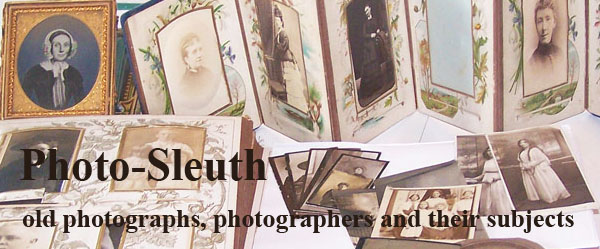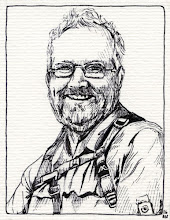
Corporal Robert Hollis, Machine Gun Corps
Postcard portrait by Pollard Graham, 108A Friargate, Derby, c.1917-1918
Image © and Courtesy of Fran Powles
Derby photographers were no exception, and it is informative to note that Pollard Graham shut eight of their branches in the Midlands - from Northampton to Burslem to Lincoln - between 1913 and 1916, leaving only the headquarters studio serving customers. Even after the war, it would be some time before business picked up sufficiently for the firms to contemplate expansion again, with their first post-war branch opening in 1920. Understandably, their clientele had changed too, with the majority of clients being uniformed soldiers about to head off to war. Postcards tended to be the predominantly used format. For most people there wasn't much spare cash around for the fancier mounts and frames.
Corporal Hollis of the Machine Gun Corps probably had this portrait taken on a visit home from the front, perhaps even after a period of recuperation, since he is sporting a wound stripe on his left sleeve.

The Brown family, Postcard portrait by Pollard Graham,
108A Friargate, Derby, 13 July 1917
Image © and Collection of Brett Payne
While most portraits tended to be a single figure, or perhaps couple, I am fortunate enough to have a group portrait of my grandmother's family, the Browns, taken in the summer of 1917. The older two of her three brothers are dressed in uniform. Arthur was a Corporal/Sergeant Dispenser, RAMC, and served with the 57th North Midlands Field Ambulance Unit. He became a chemist after the war. I'm not sure what unit Frank served in, and the insignia on his lapels are not clear enough for me to make out. Ethel worked as an apprentice milliner before the war, but during the war both she and her mother Edith served in some medical capacity, probably at a hospital in Derby. Edith has what appears to be an RAMC badge pinned to the front of her dress, Ethel some other type which I've been unable to identify. Percy was still at school, while Fred Brown, at 47, was presumably too old to be called for active service.

Unidentified Royal Navy man, perhaps with his father
Postcard portrait by Pollard Graham, 108A Friargate, Derby, c.1917-1918
Image © and Courtesy of Grace-Ellen Capier
This rather nice vignetted portrait shows an unidentified Royal Navy man seated with an older bearded gentleman who may be his father. I can't decide whether the single stripe on his left arm signifies that he holds the rank of "Able Seaman, Higher Grade," or whether it is a "Good Conduct" badge. Also just visible on his right sleeve is part of another badge. By comparison with Royal Navy Badges used during the First World War, it may be something like an Armourer's badge.

Thomas Frederick (Fred) Green, Royal Garrison Artillery
Postcard portrait by Pollard Graham, 108A Friargate, Derby, c.1917-1918
Image © and Courtesy of Betty Bowler
A very young Fred who also visited Pollard Graham's studio, probably on the eve of his departure for the front, is wearing standard Great War issue uniform with an RGA (Royal Garrison Artillery) shoulder title. The Medal Index Cards show a Thomas F. Green, 189835, Gunner in the Royal Garrison Artillery, entitled to the Victory and British War Medals.

Unidentified young man, Army Ordnance Corps, c.1914-1918
Postcard portrait by F.J. Boyes, 22 & 24 Osmaston Road, Derby
Image © and Collection of Brett Payne
Frederick J. Boyes was another Derby photographer who attended to portrait requirements of those dutiful young men during the Great War. The AOC shoulder title of this unidentified young man with his very neatly combed hair show that he served with the Army Ordnance Corps, which dealt "with the supply and maintenance of weaponry, munitions and other military equipment."

Uncle Bill (Notts & Derby Regiment) and Auntie Hilda, c.1914-1918
Postcard portrait by F.J. Boyes, 22 & 24 Osmaston Road, Derby
Image © and Collection of Brett Payne
This young man and his new bride (I presume from the prominently displayed wedding ring) are identified on the reverse only as Uncle Bill and Auntie Hilda, but he wears the shoulder titles of the Notts and Derbys Regiment, as well as a circular badge containing a red cross, similar to that of Arthur Brown, above, which may signify that he is some sort of medical orderly.

Charlotte and Alfred Horobin with their nieces, c.1915-1916
Postcard portrait by F.J. Boyes, 22 & 24 Osmaston Road, Derby
Image © and Courtesy of Sally Jackson
Sally Jackson sent me this portrait of her grandparents Alfred Irvin Horobin and his wife Charlotte Louisa née Brady with their nieces, daughters of his half brother, Arthur Swinfield Newton and his wife Lillia née Tomlinson. Alfred is dressed in uniform, wears shoulder titles of the RFA (Royal Field Artillery), and has a crown on his sleeve, suggesting he was a warrant officer. His finely waxed moustache, not clearly visible in this image, is certainly in keeping with that rank - all he needs is a swagger stick - but I've been unable to find an appropriate Medal Index Card for him.

Frederick William Lomas of Derby, c.1914-1916
Postcard portrait by R. & R. Bull, Ashbourne
Image © and Courtesy of Derek Smith
Unfortunately this portrait of a fresh-faced Frederick William Lomas, taken by the Ashbourne firm of R. & R. Bull early during the war, is not clear enough for me to read his shoulder titles.

Unidentified man and woman, c.1914-1918
Postcard portrait by H. Hinge, Ashbourne
Image © and Courtesy of Ellen Oakley
Henry Hinge, also of Ashbourne, took this rather wooden - and now pretty battered - portrait of a non-commissioned officer, identified on the reverse only as "Gran's brother," and his presumed wife. He has sergeant's stripes on his lower sleeve, as well as two wound stripes, and is also holding a swagger stick, which makes me wonder whether he is a drill or staff sergeant. His shoulder titles are not visible, and I'm not familiar enough with regimental badges to recognise the one on his cap.


Louisa and Doris McAuslan at Green Hall Hospital
Postcard portraits by Frederick Holbrook, George St Studios, Belper
Images © and Courtesy of Robert Silverwood
Louisa McAuslan and her daughter Doris were working for the Red Cross at Green Hall Hospital in Belper during the war, when Belper photographer Frederick Holbrook visited and took these two fine portraits.

Frank Tomlinson, c.1914-1918
Panel print portrait by Seaman & Sons, Chesterfield
Image © and Courtesy of Phil Gregory
This less common format by Seaman & Sons of Chesterfield is often known as a panel print, although it is not too different from a postcard cut into three, and I have often seen them constructed in that manner. Phil Gregory's relative Frank Tomlinson obviously served in a Scots Regiment during the war, as evidenced by his Glengarry hat, but I have no further information about him.

Sergeant George Manning, Royal Field Artillery, c.1917
Mounted print by W.W. Winter, Derby
Image © and Courtesy of Christine Hibbert
Sergeant George Manning of the Royal Field Artillery paid a visit to the studio of W.W. Winter in Midland Road Derby "whilst at home on leave from the battlefields of Europe." The single bar on his lower left sleeve is a wound stripe, indicating that he had already been wounded in the line of duty.
Geoff Caulton's PhotoDetective web pages have some excellent descriptions and images of uniforms, badges, shoulder titles and other tips for identifying subjects on portraits from the Great War.
Roger Capewell has an extensive web site devoted to Military Images, including a comprehensive list of badges with images.
For questions about the Great War, both of a specific and more general nature, the Great War Forum is well worth trying. Chris Baker's The Long, Long Trail gives valuable advice on how track a particular soldier's service during the war, including an excellent article on how to interpret Medal Index Cards.








As ever a highly informative and enjoyable read. I do like the two nurses photographs; they remind me of Vera Brittain. Thank you for the pointer to the forums too - very useful.
ReplyDeleteMy father and one Uncle served in WWI. I shall have to check what units they were in. The only clue I have is on a photo of a village list in the church of all who served.
ReplyDeleteYour photos are a valuable record of those times - thanks for the forum links too.
Great alternate take on the theme! Very informative post on WWI photographs and uniforms. Thanks!
ReplyDeleteWhat a great collection. I wonder how many of these soldiers posed reluctantly for photos just to appease their mothers. The first one certainly looks as if that could be the case. I just love the photos of the mother and daughter nurses.
ReplyDeleteA fascinating collection. It happens that I am a quarter way though an excellent book on WW I from the perspective of the British experience - To End All Wars by Adam Hochschild. It includes many interesting details of family lives along with the weave of political and military history. It may end up in my top 25 best books list if not top 10. Your pictures compliment its story of Britons entering the war in 1914.
ReplyDeleteAnother brilliant post Brett. The Pollard Graham photos of the Brown family, the sailor with his father and the young Thomas Fred Green are particularly poignant.
ReplyDeleteI didn't realize there was so much information available for researching WWI soldier photos. I wonder if there are comparable sources for American soldier photos.
ReplyDeleteAn absolutely mind boggling post with ever so much detailed information. Of all the photos, my favorite is the one of the Navy man with the elderly gentleman. It almost looks as though they could be seated in water.
ReplyDeleteIt is good to see all the old photos and to hear the stories how the companies did or did not survive the first war. Postcard photos fascinate me as I am not that familiar with them. Great post of some great history of people.
ReplyDeleteThomas Frederick Green doesn't look anything like old enough to be fighting. yet I'm just back from a visit to the Somme and can say I've seen the graves of such young men.
ReplyDeleteI'd say he did a lot! What a fine collection of photos...all put together very nicely with great detailed descriptions, like you do so well. Thanks!
ReplyDeleteA very interesting post. Whenever I see these sort of pictures, I can't help but wonder what became of the subjects...
ReplyDeletethat is an impressive collection you got here. i must say WW1 was not much of an issue this side of the atlantic, my family going on its regular business in that small location where they come from...
ReplyDeletebut this nonetheless proved very informative. thanx 4 sharing!! must have been a lot of work.
:)~
HUGZ
So many wonderful images and great information. I have so many photos of Scottish relatives in uniform during WWI and have never given them much thought. They remained in Scotland when the rest of the family immigrated to the US. So I have no stories or information about them. You've now provided me with a starting point. Thank you!
ReplyDelete